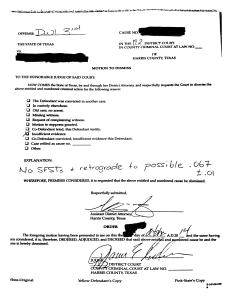John Denholm had a recent Felony DWI-3rd where the blood analysis was conducted by the Harris County Institute of Forensic Sciences (IFS). The IFS says they are impartial and are only on the “side of science.” In this case, they were.
Here, the accused had exercised his constitutional rights not to cooperate with law enforcement and provide evidence against himself. He would not participate in any Standardized Field Sobriety Test, refused to answer any questions, and refused to voluntarily submit a specimen of his breath or blood. The arresting officer obtained a search warrant and blood was drawn approximately two hours after the stop. When tested, it was reported out as a blood alcohol concentration (BAC) of 0.083 ± 0.007 g/100 mL. In other words, the blood alcohol concentration fell within the range of 0.09 to 0.0796. Clearly, retrograde extrapolation would be an issue in the case.
Doing his due diligence before trial, John scheduled a meeting with the analyst, Josie Hollowell. When he arrived at the IFS, he was greeted not only by Hollowell, but by both the Technical Reviewer, Patricia Small and the Expert Reviewer, Dr. Jeff Walterscheid. During the meeting, the discussion included the blood being first reported out at 0.098. Per the IFS protocol, a 2nd analysis was required to confirm the 1st. However, the 2nd analysis reported out at 0.083, which necessitated yet a 3rdanalysis of the same sample. This time the blood reported out at 0.086.
IFS protocol dictated only the lowest result is sent to the State. The blood was reported out at 0.083 and with the margin of error being +/- 0.007, was below the legal limit.
Normally, this is when an “expert” witness for the State will perform a miraculous extrapolation and explain how the defendant was much higher at the time of the stop. But the expert witness for the science was intellectually honest and said otherwise. When considering all the possibilities and giving estimates based on the time of arrest being both prior to or after peak alcohol absorption into the blood, the IFS opined the BAC at the time of arrest could even have been as low as 0.067 ± 0.01.
You have to give credit where credit is due…
“The court evaluating the reliability of a retrograde extrapolation should also consider (a) the length of time between the offense and the test(s) administered; (b) the number of tests given and the length of time between each test; and (c) whether, and if so, to what extent, any individual characteristics of the defendant were known to the expert in providing his extrapolation. These characteristics and behaviors might include, but are not limited to, the person’s weight and gender, the person’s typical drinking pattern and tolerance for alcohol, how much the person had to drink on the day or night in question, what the person drank, the duration of the drinking spree, the time of the last drink, and how much and what the person had to eat either before, during, or after the drinking.”
Mata v. State, 46 S.W.3d 902 (Tex. Crim. App. 2001)


Leave a comment